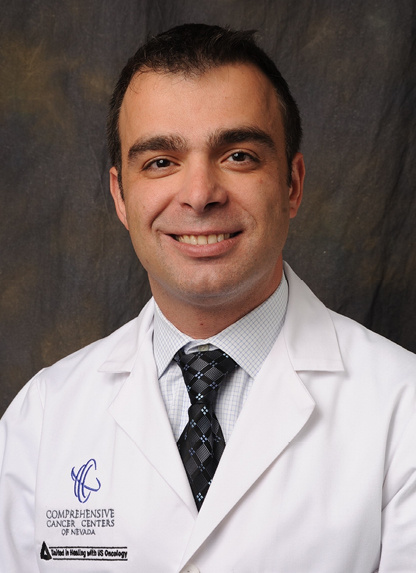Fadi Braiteh, MD

Dr. Fadi Braiteh
Director, Phase 1 Translational Oncology Program (TOP) Director, GI Malignancies Program
Dr. Fadi Braiteh is a medical oncologist and Director of the Translational Oncology Program for Comprehensive Cancer Centers of Nevada as well as a Clinical Associate Professor for the UNLV School of Medicine in Las Vegas. A graduate of medical school in Beirut, Lebanon, who did his post-graduate training at the Yale School of Medicine and M.D. Anderson Cancer Center, he is the author of more than 80 peer-reviewed articles and was featured in The New York Times in relation to his work with gene therapy.
Please give us a sense of your personal background.
My parents were university teachers – my father taught history and sociology and my mother taught French literature. Growing up during part of the Civil War in Lebanon (it lasted from 1975-1990) I remember losing a lot of schoolmates to violence that included car bombs. The civil war did create an existential crisis for me. Parental guidance – my parents helped me plan for a solid education and brighter career – and an obsessive dedication to reading were my salvation during the grim, day-to-day weight of the war. I still recall that at age 15 – half of my time was confined to a bunker when school was suspended because of the war – I read close to 200 books. That period transformed my life.
Why did you go into medicine?
At first, I was drawn to history and was fascinated by potentially becoming an archeologist. On the other hand, I was interested in mathematics, physics and chemistry, and vividly remember starting a high school chemistry aficionados lab and dreaming of becoming an astrophysicist. When you grow up during a war, you become more realistic about a career and ultimately, because of the empathetic dimension of medicine, it became a winner. I wanted to embrace a career of challenge and discovery and originally I thought I would specialize in neurology, but, in medical school, I realized how quickly medical oncology was evolving. Over the span of 15 years – from the time I had my fellowships until today – I have seen tailoring treatment options to the patient’s specific makeup evolving from futuristic science fiction to a standard of care.
How did you come to practice in the U.S.?
I had no plans to even study in the USA when I won the 1st prize on the Dean’s List for an end-of-studies thesis, which was on cancer research. An epiphany hit me: If you want the best training, go to where the best is. I ended up being admitted to the Yale School of Medicine’s St. Raphael Hospital Program. An early encounter with cancer patients helped me seal my decision to pursue medical oncology rather than surgical oncology. Again, I wanted to join the best, so it had to be M.D. Anderson Cancer Center. Sure enough, I was granted permission to train with the center. An invitation from Comprehensive Cancer Centers of Nevada in 2009 led me to join its practice, building up a budding clinical research operation with a focus on gastro-intestinal cancers and thoracic/breast malignancies.
During your career, what has been particularly rewarding?
I have been fortunate to be on the front line of the clinical development of treatments for cancer, joining tens of thousands of scientists who brought the field of immune oncology to be a standard approach to many cancer patients. It is a field where a new drug can invigorate the failing immune system to do its job of fighting and sometimes eliminating the cancer cells in the patient. We have seen unprecedented results, even cures, where such was not but fantasy in some Stage IV cancer cases. Now we have patients, some nine years later, be cancer free. We have come a long way, although we still have room to improve. As of today, the FDA approves a new drug, or new use for a drug, on average of once a week. There is no other field in medicine that beats those numbers.
What effect has cancer care had on you?
Every day I spend taking care of cancer patients reminds me of the brutal reality that life is not fair, but that humans should make it as close as possible to fair. Medicine is humanizing, it makes us realize what matters most and what distinguishes us from other species is to care for each other, to be compassionate. I have realized that dedicating yourself to the well-being of others can be the ground for one’s own happiness.
What are some of the exciting advances you see in the future of cancer treatment?
In the next two decades we will witness a significant change in how we might monitor cancer patients – not just by imaging, but by specific blood tests. We will detect cancer in healthy individuals early on with blood tests, detect cancer recurrences very early on, while we continue on expanding, tailoring treatments to the specific molecular makeup of each individual patient.
